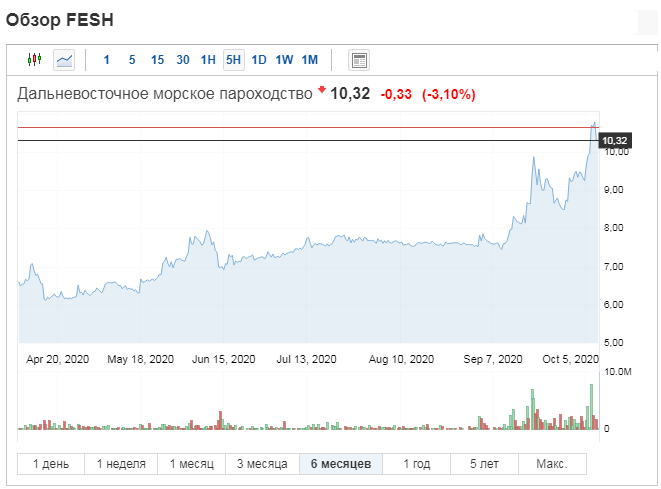A truly criminal drama takes place at the Vladivostok Commercial Sea Port.
The conflict among the port’s shareholders became public in early September and has been at the center of the news ever since, especially after the October 5 incident at the port, which involved port workers and the newly appointed management.
FESCO is one of the largest Russian shipping companies that transports goods using its own foreign trade and coastal sea lines, carries out rail transportation from the Far East to Russia and the CIS, as well as to the countries of Central Asia and Europe.
The company also includes the Vladivostok Commercial Sea Port with an annual throughput of 5 million tons of cargo, oil products and up to 150 thousand vehicles.
The company employs about 2,500 people who serve 15 berths in the port.
The conflict among the shareholders of the group became public domain in early September, when the chairman of the board of directors of the transport group Leyla Mammadzade convened an emergency meeting of the Council, at which the powers of the current president of FESCO, who had been in office for six months, were early terminated.
Arkady Korostelev was appointed in his place. He was elected by an overwhelming majority of a member of the board of directors of PJSC «DMVP» (the parent company of the group). In the past, he held the position of Vice President of Commerce at FESCO.
In mid-September, the chairman of the board of directors filed an application to London International Arbitration «in respect of companies associated with Ziyavudin Magomedov «(the largest shareholder of the company at that time, who has been in jail since 2018).
The company’s management believes that the groups of the oligarch and the American investment fund TPG GROUP (17.4% of FESCO’s shares) should return the group $ 1.046 billion taken in the form of loans.
This was followed by a statement by Ziyavudin Magomedov himself about an attempted raider takeover of the company.
After that, the general director of the port was removed from his post, and the general meeting of shareholders of the company scheduled for September 30 did not take place, according to the company’s official information, due to the lack of a quorum.
At the same time, GHP Group Mark Gerber sells his 23.8% stake in the FESCO transport group, as the owner considered it right for himself to avoid possible problems in the context of a shareholder conflict and a pandemic. the transport company may face.
The amount of the deal was not specified, but following the results of trading on the Moscow Exchange on October 2, 23.8% of FESCO was worth 6.5 billion rubles.
There are many versions of the conflict: these are the possible actions of the company’s management in the interests of «third parties» after an unsuccessful attempt to force the main shareholder to sell his last surviving asset during the court proceedings, and the possible desire of the disgraced oligarch to draw media attention to the conflict in order to delay time for making a decision according to his preliminary conclusion, the term of which is about to come to an end (which may allow him to avoid part of the criminal articles or change them to lighter ones).
They do not exclude an analogy with the recent events in Bashkiria, and many more assumptions.
This is not the point, and it is not for us to understand it.
Several points are more important:
For several years the company has been teetering on the brink of a financial abyss, contriving to default on payments on its Eurobonds, issued in the amount of over $ 800 million.
The panic of investors was understandable, because by that time there were two more Eurobonds issues worth 7 billion rubles.
But by selling off part of its assets (approximately 25% of TransContainer was sold to VTB, which had been pledged by the bank since 2014) and focusing on container transportation, the company was able to significantly reduce its debt burden.
Although in the long term, this deal meant a decrease in revenue from container shipping.
And, apparently, after the failed deal with the world’s largest port operator DP World, there is a possibility that a major strategist will become the company’s shareholders (possibly in partnership with the state)
This logic can be traced in the company’s stock price on the Moscow Exchange:

Against the backdrop of such public conflicts within the company, shares have made almost a 40% leap up since the beginning of September, although their movement should have been directed in the other direction.
Apparently, the company is being prepared for a major sale. And most likely, the new major shareholder will make a mandatory offer to minority shareholders.
And the offer price will depend on the last major deal. And then the intrigue …
By the way, the GHP Group, which owns 17.4% of the shares, is also negotiating the sale. If their share is redeemed by the current owners of the remaining 33.9% stake, they will receive a controlling stake.
And 32.5% still remains with Mr. Magomedov.
Competition in the Far East is getting tougher, as this region is in the sphere of interests of Chinese and Japanese logistics companies.
And in this conflict, apparently, not everything went according to plan, and as a result, in just a couple of months, the company went from being a favorite of investors to a company with an opaque shareholder structure, hidden debts and cross-financing of third-party projects of shareholders and top managers.
And this is a serious blow to the reputation of the entire logistics industry in Russia and its claims to leadership in transcontinental transportation.
(In preparing the material, data from open sources were used)

